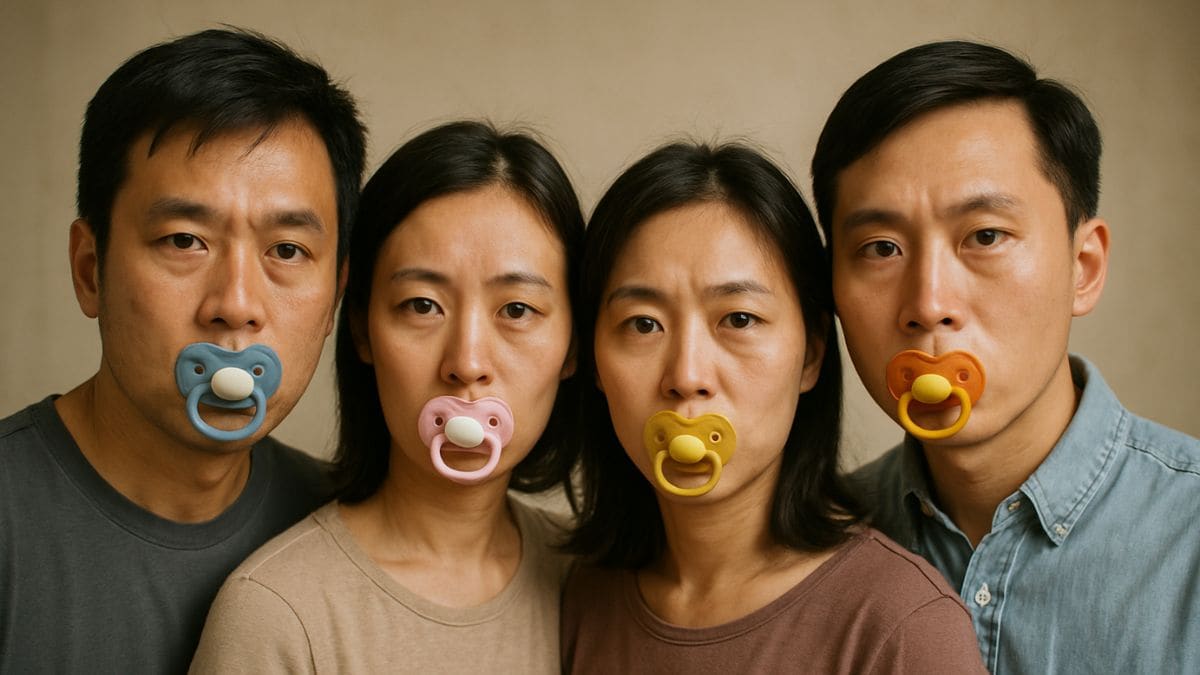Adult pacifiers, once unimaginable outside of infant care, have become a surprising consumer phenomenon in China.
Marketed for purposes ranging from easing stress to aiding sleep, these oversized silicone and rubber products have sparked a wave of online purchases.
While many consumers swear by their benefits, health experts warn of possible physical harm and question whether these pacifiers address deeper emotional needs, reported South China Morning Post (SCMP).
In recent months, e-commerce platforms such as Taobao and JD.com have seen a surge in listings for adult pacifiers.
These products, designed to fit the mouths of grown-ups, are considerably larger than their infant counterparts.
STORY CONTINUES BELOW THIS AD
The nipple is generally transparent, while the shield can be found in a range of colours.
Prices vary widely — some sell for as little as 10 yuan (approximately US$1.40), while premium versions are listed at up to 500 yuan (about US$70).
According to figures reported in Chinese media, certain online shops are now selling thousands of these pacifiers every month. Some distributors have stated they move more than 2,000 units in that period.
Promotional materials often highlight benefits such as promoting relaxation, improving sleep quality, providing psychological comfort, assisting in quitting smoking, and even encouraging proper breathing techniques.
Why people are buying them
The appeal of these products is evident in customer feedback. One reviewer wrote, “It is high quality, soft, and I feel comfortable sucking it. It does not impede my breathing.”
Another shared, “It is amazing in helping me quit smoking. It gives me psychological comfort and makes me not so fidgety during my smoke cessation periods.”
A third consumer commented, “When I am under pressure at work, I suck on the dummy. I feel I am indulged in a sense of safety from childhood.”
For some users, the pacifier functions as a tool for relaxation in stressful work environments, while others incorporate it into nighttime routines to aid in falling asleep, reported SCMP.
STORY CONTINUES BELOW THIS AD
Several buyers have linked its use to managing anxiety or coping with feelings of burnout.
A number of people attempting to quit smoking say the pacifier serves as a substitute oral fixation, helping them endure cravings without lighting a cigarette.
The psychological explanation
Mental health professionals say the practice may be tied to what is known as the “regression phenomenon,” a psychological response in which adults revert to behaviours or objects associated with childhood comfort when faced with high stress or emotional strain.
This behaviour, they note, can temporarily provide a sense of security and reduce anxiety.
Zhang Mo, a psychologist in Chengdu, told SCMP, “The real solution is not to treat themselves as a child, but to face the challenge directly and to solve it.”
She explained that while these pacifiers might offer short-term relief, they could also prevent individuals from confronting underlying issues. Instead of addressing the root causes of stress or anxiety, the object may serve as an avoidance mechanism.
While consumer enthusiasm continues to grow, dental and medical professionals have raised multiple red flags about prolonged use.
Tang Caomin, a dentist based in Chengdu, cautioned that extended use — particularly more than three hours per day — could lead to structural changes in the mouth.
“By sucking the dummy for more than three hours a day, the position of your teeth might change after a year,” he told SCMP. He also noted that frequent pacifier use could reduce jaw mobility and cause pain while chewing.
STORY CONTINUES BELOW THIS AD
Tang expressed additional safety concerns, especially when the pacifier is used during sleep. If components become loose, there is a risk that parts could be inhaled or swallowed, potentially causing choking or suffocation.
Other possible complications include oral infections from continuous contact with the device, and breathing difficulties if airflow is obstructed. “The potential damage to customers’ mouths by the pacifiers is intentionally played down by their sellers,” Tang remarked.
Health experts also warn that relying on a pacifier to cope with stress could mask existing emotional or psychological conditions.
Without proper treatment, these issues might worsen over time, even if the user experiences temporary comfort.
The unusual sight of adults openly using pacifiers has generated intense discussion on Chinese social media. A topic related to the trend reportedly amassed more than 60 million views on one platform.
Reactions have ranged from disbelief to humour. “This world has become so mad that adults are using pacifiers,” one online user commented.
Another quipped, “Is this not a kind of stupid tax?”
Some defend the practice as a harmless and personal choice, arguing that in an increasingly stressful society, adults should be free to seek comfort in any safe form they choose.
STORY CONTINUES BELOW THIS AD
Others see it as a symptom of growing emotional fragility, particularly among younger generations.
Short videos on platforms like TikTok show adults in the United States and South Korea using pacifiers in various scenarios — during traffic jams, in the middle of high-pressure workdays, or as a means to unwind before bed.
In many cases, the users cite similar reasons to those given by Chinese buyers: reducing anxiety, relieving stress, and achieving better sleep.
Not a long term solution
However, medical and psychological professionals outside China echo the same concerns as their Chinese counterparts, stressing that while the pacifier may provide temporary relief, it is not a substitute for long-term mental health strategies or proper medical care.
The popularity of adult pacifiers sheds light on the increasing need for accessible coping mechanisms in societies where stress, anxiety,
and burnout are on the rise.
Unlike structured interventions such as therapy, exercise routines, or mindfulness training, pacifiers offer a quick, low-effort form of relief that does not require significant lifestyle changes.
Also Watch:
With inputs from agencies
